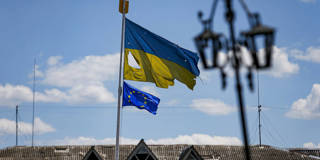Russia’s full-scale invasion of Ukraine has made clear that interdependence cannot prevent war. But we also know that rejecting interdependence – and thus renouncing the multilateralism the world needs to address shared problems – cannot guarantee peace.
MADRID – Of all the lessons that can be drawn from the year that has passed since Russia invaded Ukraine, one stands out: global interdependence does not guarantee peace, and must be adapted to the realities exposed by recent events.
According to Harvard’s Joseph S. Nye, Jr., and Princeton’s Robert O. Keohane, interdependence refers to the relationship of mutual dependence that develops between states as a result of their interactions, especially economic and trade ties. Given the intertwined nature of markets and politics (including geopolitics), states end up needing one another to bolster their security (including energy security) and achieve economic growth and development.
In recent decades, interdependence has held a privileged position in Western political thought. While a revision of the concept is inevitable, to ignore the positive contribution that interdependence has made to promoting global stability and security in Europe since the end of World War II would be dishonest and unproductive.

MADRID – Of all the lessons that can be drawn from the year that has passed since Russia invaded Ukraine, one stands out: global interdependence does not guarantee peace, and must be adapted to the realities exposed by recent events.
According to Harvard’s Joseph S. Nye, Jr., and Princeton’s Robert O. Keohane, interdependence refers to the relationship of mutual dependence that develops between states as a result of their interactions, especially economic and trade ties. Given the intertwined nature of markets and politics (including geopolitics), states end up needing one another to bolster their security (including energy security) and achieve economic growth and development.
In recent decades, interdependence has held a privileged position in Western political thought. While a revision of the concept is inevitable, to ignore the positive contribution that interdependence has made to promoting global stability and security in Europe since the end of World War II would be dishonest and unproductive.